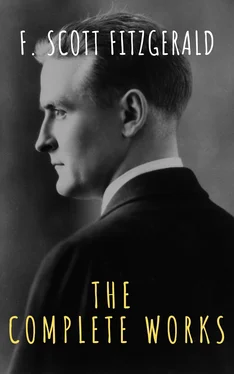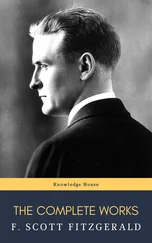She gasped.
“So all you got to do,” he went on, “is to pretend you never saw any barber.”
They were now at the south end of the village and Amanthis saw a row of cars parked in front of a two-story building. The cars were all low, long, rakish and of a brilliant hue. Then she was ascending a narrow stairs to the second story. Here, painted on a door from which came the sounds of music and voices were the words:
JAMES POWELL; J. M.
“Dice, Brassknuckles and Guitar”
Mon.—Wed.—Fri.
Hours 3-5 P.M.
“Now if you’ll just step this way——” said the Principal, pushing open the door.
Amanthis found herself in a long, bright room, populated with girls and men of about her own age. The scene presented itself to her at first as a sort of animated afternoon tea but after a moment she began to see, here and there, a motive and a pattern to the proceedings.
The students were scattered into groups, sitting, kneeling, standing, but all rapaciously intent on the subjects which engrossed them. From six young ladies gathered in a ring around some indistinguishable objects came a medley of cries and exclamations—plaintive, pleading, supplicating, exhorting, imploring and lamenting—their voices serving as tenor to an undertone of mysterious clatters.
Next to this group, four young men were surrounding an adolescent black, who proved to be none other than Mr. Powell’s late body-servant. The young men were roaring at Hugo apparently unrelated phrases, expressing a wide gamut of emotion. Now their voices rose to a sort of clamor, now they spoke softly and gently, with mellow implication. Every little while Hugo would answer them with words of approbation, correction or disapproval.
“What are they doing?” whispered Amanthis to Jim.
“That there’s a course in southern accent. Lot of young men up here want to learn southern accent—so we teach it—Georgia, Florida, Alabama, Eastern Shore, Ole Virginian. Some of ’em even want straight nigger—for song purposes.”
They walked around among the groups. Some girls with metal knuckles were furiously insulting two punching bags on each of which was painted the leering, winking face of a masher. A mixed group, led by a banjo tom-tom, were rolling harmonic syllables from their guitars; there were couples dancing flat-footed in the corner to a record made by Rastus Muldoon’s Savannah Band. “Now, Miss Powell, if you’re ready I’ll ask you to take off your hat and go over and join Miss Genevieve Harlan at that punching bag in the corner.” He raised his voice. “Hugo,” he called, “there’s a new student here. Equip her with a pair of Powell’s Defensive Brassknuckles—debutante size.”
I regret to say that I never saw Jim Powell’s famous school in action nor followed his personally conducted tours into the mysteries of Dice, Brassknuckles and Guitar. So I can give you only such details as were later reported to me by one of his admiring pupils. During all the discussion of it afterwards no one ever denied that it was an enormous success, and no pupil ever regretted having received its degree—Bachelor of Jazz.
“If I could keep it dark,” Jim confided to Amanthis, “I’d have up Rastus Muldoon’s Band from Savannah. That’s the band I’ve always wanted to lead.”
He was making money. His charges were not exorbitant—as a rule his pupils were not particularly flush—but he moved from his boarding house to the Casino Hotel where he took a suite and had Hugo serve him his breakfast in bed.
The establishing of Amanthis as a member of Southampton’s younger set was easier than he had expected. Within a week she was known to everyone in the school by her first name. Jim saw less of her than he would have liked. Not that her manner toward him changed—she walked with him often, she was always willing to listen to his plans—but after she was taken up by the fashionable her evenings seemed to be monopolized. Several times Jim arrived at her boarding house to find her out of breath, as if she had just come in at a run, presumably from some festivity in which he had no share.
So as the summer waned he found that one thing was lacking to complete the triumph of his enterprise. Despite the hospitality shown to Amanthis, the doors of Southampton were closed to him. Polite to, or rather, fascinated by him as his pupils were from three to five, after that hour they moved in another world.
His was the position of a golf professional who, though he may fraternize, and even command, on the links, loses his privileges at sundown. He may look in the club window but he cannot dance. And, likewise, it was not given to Jim to see his teachings put into effect. He could hear the gossip of the morning after—that was all.
But while the golf professional, being English, holds himself proudly below his patrons, Jim Powell, who “came from a right good family down there—pore though,” lay awake many nights in his hotel bed and heard the music drifting into his window from the Katzbys’ house or the Beach Club, and turned over restlessly and wondered what was the matter. In the early days of his success he had bought himself a dress-suit, thinking that he would soon have a chance to wear it—but it still lay untouched in the box in which it had come from the tailor’s. Perhaps, he thought, there was some real gap which separated him from the rest. It worried him.
Late in September came the Harlan dance, which was to be the last and biggest of the season for this younger crowd. His academy would close the day before because of the general departure of his pupils for more conventional schools. Jim, as usual, was not invited to the dance. He had hoped that he would be. The two young Harlans, Ronald and Genevieve, had been his first patrons when he arrived at Southampton—and it was Genevieve who had taken such a fancy to Amanthis. To have been at their dance—the most magnificent dance of all—would have crowned and justified the success of the waning summer.
His class, gathering for the afternoon, was loudly anticipating the next day’s revel and he was relieved when closing time came.
“Good-bye,” he told them. He was wistful because his idea was played out and because, after all, they were not sorry to go. Outside, the sound of their starting motors, the triumphant putt-putt of their cut-outs cutting the warm September air, was a jubilant sound—a sound of youth and hopes high as the sun.
They were gone—he was alone with Hugo in the room. He sat down suddenly with his face in his hands.
“Hugo,” he said huskily. “They don’t want us up here.”
“Don’t you care,” said a voice.
He looked up to see Amanthis standing beside him.
“You better go with them,” he told her.
“Why?”
“Because you’re in society now and I’m no better to those people than a servant. You’re in society—I fixed that up. You better go or they won’t invite you to any of their dances.”
“They won’t anyhow, Jim,” she said gently. “They didn’t invite me to the one tomorrow night.”
He looked up indignantly.
“They did n’t?”
She shook her head.
“I’ll make ’em!” he said wildly. “I’ll tell ’em they got to. I’ll—I’ll——”
She came close to him with shining eyes.
“Don’t you mind, Jim,” she soothed him. “Don’t you mind. They don’t matter. We’ll have a party of our own tomorrow—just you and I.”
“I come from right good folks,” he said, defiantly. “Pore though.”
She laid her hand softly on his shoulder.
“I understand. You’re nicer than any of them, Jim.”
He got up and went to the window and stared out mournfully into the late afternoon.
Читать дальше












